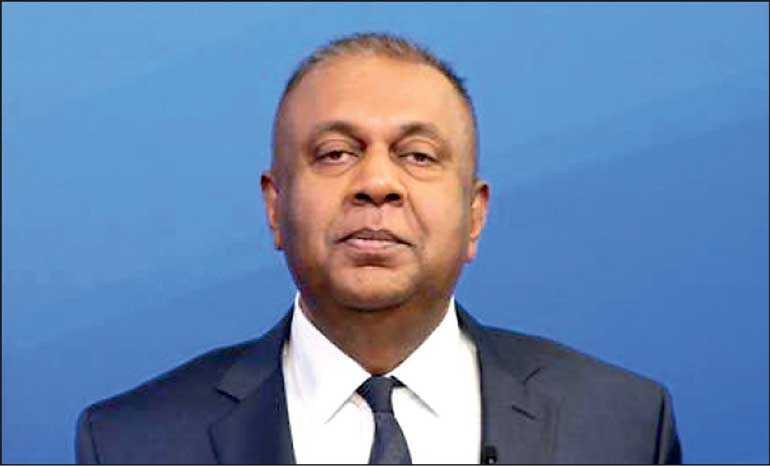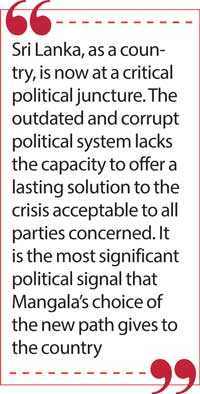Monday Feb 16, 2026
Monday Feb 16, 2026
Friday, 19 June 2020 00:00 - - {{hitsCtrl.values.hits}}

The decision reached by Mangala Samaraweera who is considered a colourful, controversial, daring and creative political figure in the old or the traditional political landscape of Sri Lanka, which is currently on the verge of decay and death, to abandon the course of traditional politics and choose to tread on an  alternative path can be seen as a silver line in the pitch darkness.
alternative path can be seen as a silver line in the pitch darkness.
Despite the serious cardiac condition suffered a few days ago, I am bound to produce this brief note analysing the factors that led to Mangala Samaraweera’s sudden change of political course to tread on a new path.
He had several rounds of discussions with me before he chose this new path. He was aware that I was an activist of the Punarudaya movement when he had discussions with me. We both had longstanding acquaintances, and there were occasions when we had even entered into heated arguments in public debates on various issues of public importance. For some time we did not have close contact, which resumed during the latter part of the regime of the previous Government.
Mangala invited me to deliver the keynote address at the launching of his biography. He allowed me to choose the topic of the address. I talked about the Sri Lankan crisis. I pointed out that Sri Lanka remained a flourishing country among Asian countries when it gained independence and explained how it had plunged into the present unfortunate plight following the transfer of ruling power to our leaders. My speech can be regarded as a serious allegation made against the parties that ruled the country since independence.
I stated that the traditional political parties of Sri Lanka do not have a realistic solution to the crisis faced by Sri Lanka and in that context the total collapse of the socio-political system and the economy of the country is inevitable.
The speech I delivered at this function, which was attended by a large number of UNP leaders and the supporters of Mangala in the Matara District, cannot have been a source of strength for the Presidential Election campaign of the party. However, my speech did not anger Mangala. Delivering the vote of thanks, he admitted that not only the two main political parties that ruled the country alternately, but also he himself was responsible for the plight of the country, for which he expressed his regret.
Following the defeat at the Presidential Election and the handing over of nominations for Parliamentary Elections, he convened a meeting of a small group of selected people to further discuss the crisis Sri Lanka is facing. There it was discussed in detail.
There were two prominent economic experts among those who were present at this discussion. Two Central Committee members of the Punarudaya Movement also participated in two rounds of discussions held in this regard with me. All participants shared the view that the crisis in Sri Lanka had gone too far and was beyond control, with the inevitable collapse of the socio-political system and the economy of the country. 
The next discussion was on what we, and especially Mangala, could and should do to save the country from this unfortunate situation. Everyone agreed that we should launch a strong public movement with an advanced vision capable of achieving structural reforms needed for building the country.
The role of Mangala in this connection was also discussed. I was strongly of the view that Mangala should withdraw himself from the old political path and contest of the forthcoming Parliamentary election, and play a strong role in a public program aimed at rescuing the country from the abyss into which it had fallen. Some of them were of the view that he could engage in the new task without leaving the course of old politics altogether.
But, Mangala was not in agreement. He was firm in his conviction that he should move away from the old political culture which is extremely rotten and commit himself to the cause of building a new mass political movement aimed at rescuing the country.
Everyone who attended the discussion was of the view that they possessed the ability to stand up for the cause of the new movement with self-confidence as its object is free of parochial and conspiratorial schemes aimed at seizing the power.
Sri Lanka, as a country, is now at a critical political juncture. The outdated and corrupt political system lacks the capacity to offer a lasting solution to the crisis acceptable to all parties concerned. It is the most significant political signal that Mangala’s choice of the new path gives to the country.
The extensive crisis Sri Lanka is currently facing can be overcome constructively only by a true public movement which has a secular, pluralistic and democratic vision and is committed to build the Sri Lankan nation disregarding the recognition accorded to parochial and discriminatory divisions based on ethnicity, castes, and religions, and bequeath equal rights and human dignity for all those who treat Sri Lanka their motherland, and introduce structural reformations aimed at abolishing corruption, inefficiency and bureaucracy which has overwhelmed the Sri Lanka State and its institutional system, and recreating the new Sri Lanka State where the rule of law reigns supreme.
Mangala has joined such a political program of historical significance. All those who love the country and its people can become important partners of this
journey.